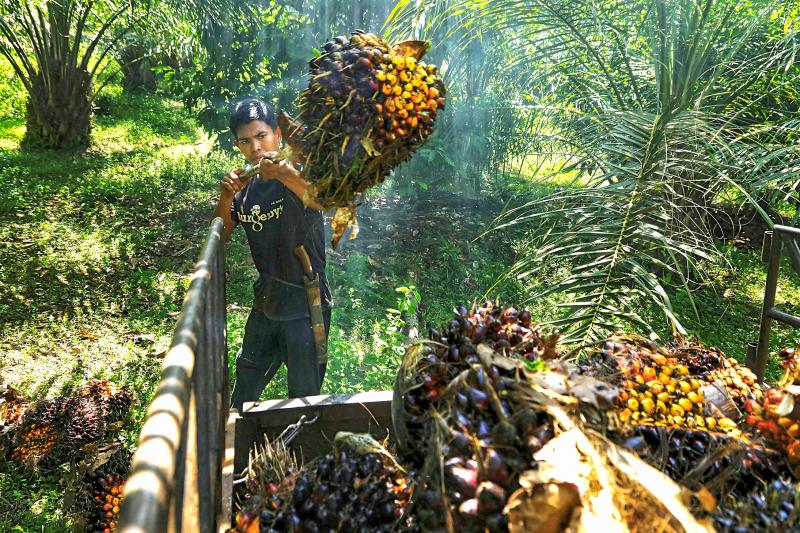Almost one-fifth of the land used for Indonesian palm oil plantations is located in the country’s forest conservation areas, despite a law banning such activity, a study by Greenpeace has found.
The report, produced by Greenpeace and TheTreeMap, describes a catastrophic failure of law enforcement that has permitted swathes of land — including UNESCO sites, national parks and areas mapped as habitats for orangutans and Sumatran tigers — to be cultivated as palm oil plantations.
Indonesia is the world’s biggest producer of palm oil, which is used in many everyday products and foods, from shampoo and lipstick to chocolate and frozen pizzas.

Photo: AFP
However, demand for palm oil is driving the destruction of carbon-rich forests that are home to Aboriginal communities and crucial to biodiversity.
Of the estimated 16.38 million hectares of palm oil plantations across Indonesia, 19 percent are found inside forest conservation areas.
The analysis, produced using maps of industrial palm oil plantation concessions and satellite imagery, found that by the end of 2019, there were 3.12 million hectares of palm oil operations across forest conservation areas.
Half of the operations (1.55 million hectares) were industrial palm oil plantations.
At least 600 plantation companies had operations set up inside forest conservation areas, the study found.
As of the end of 2019, plantings to produce palm oil in Indonesia’s forest conservation areas occupied 183,687 hectares of land previously considered orangutan habitats and 148,839 hectares of Sumatran tiger habitats.
Greenpeace Indonesian Forests Campaign head Kiki Taufik said that instead of punishing companies, the government had offered increasingly lenient amnesties for such operations.
“It’s supposed to be that [companies] are sanctioned, but now they have got the red carpet out to process the illegal [activities],” Taufik said.
It is not clear what proportion of the identified plantations have subsequently been legalized.
Policy is pushing Aboriginal and rural communities toward an apocalyptic future, he said.
“In areas where extensive forest clearance has been condoned, these landscapes are now subject to life-threatening heat waves, frequent flooding and, during the dry season, moist forest cover is now prone to annual fires,” Taufik added.
Few companies have been prosecuted for illegal developments, and those that have been punished are mostly smaller companies, the group said.
The report said that Indonesia’s Omnibus Job Creation Law, which was passed last year, provoking huge protests, would lead to further devastation.

Four people jailed in the landmark Hong Kong national security trial of "47 democrats" accused of conspiracy to commit subversion were freed today after more than four years behind bars, the second group to be released in a month. Among those freed was long-time political and LGBTQ activist Jimmy Sham (岑子杰), who also led one of Hong Kong’s largest pro-democracy groups, the Civil Human Rights Front, which disbanded in 2021. "Let me spend some time with my family," Sham said after arriving at his home in the Kowloon district of Jordan. "I don’t know how to plan ahead because, to me, it feels

‘A THREAT’: Guyanese President Irfan Ali called on Venezuela to follow international court rulings over the region, whose border Guyana says was ratified back in 1899 Misael Zapara said he would vote in Venezuela’s first elections yesterday for the territory of Essequibo, despite living more than 100km away from the oil-rich Guyana-administered region. Both countries lay claim to Essequibo, which makes up two-thirds of Guyana’s territory and is home to 125,000 of its 800,000 citizens. Guyana has administered the region for decades. The centuries-old dispute has intensified since ExxonMobil discovered massive offshore oil deposits a decade ago, giving Guyana the largest crude oil reserves per capita in the world. Venezuela would elect a governor, eight National Assembly deputies and regional councilors in a newly created constituency for the 160,000

North Korea has detained another official over last week’s failed launch of a warship, which damaged the naval destroyer, state media reported yesterday. Pyongyang announced “a serious accident” at Wednesday last week’s launch ceremony, which crushed sections of the bottom of the new destroyer. North Korean leader Kim Jong-un called the mishap a “criminal act caused by absolute carelessness.” Ri Hyong-son, vice department director of the Munitions Industry Department of the Party Central Committee, was summoned and detained on Sunday, the Korean Central News Agency (KCNA) reported. He was “greatly responsible for the occurrence of the serious accident,” it said. Ri is the fourth person

At a calligraphy class in Hanoi, Hoang Thi Thanh Huyen slides her brush across the page to form the letters and tonal marks of Vietnam’s unique modern script, in part a legacy of French colonial rule. The history of romanized Vietnamese, or Quoc Ngu, links the arrival of the first Christian missionaries, colonization by the French and the rise to power of the Communist Party of Vietnam. It is now reflected in the country’s “bamboo diplomacy” approach of seeking strength through flexibility, or looking to stay on good terms with the world’s major powers. A month after Chinese President Xi Jinping (習近平) visited,